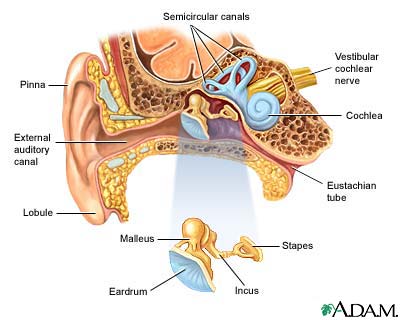Treatment
There is no known cure for age-related hearing loss. Treatment is focused on improving your everyday function. The following may be helpful:
- Hearing aids
- Telephone amplifiers and other assistive devices
- Sign language (for those with severe hearing loss)
- Speech reading (such as lip reading and using visual cues to aid communication)

A cochlear implant may be recommended for certain people with very severe hearing loss. Surgery is done to place the implant. The implant makes sounds seem louder, but does not restore normal hearing.
Prognosis (Expectations)
Age-related hearing loss is progressive, which means it slowly gets worse. The hearing loss is permanent.
Calling Your Health Care Provider
Hearing loss should be evaluated as soon as possible to rule out potentially reversible causes such as too much wax in the ear or medication side effects. It is also helpful to have a baselines hearing test so your doctor can note any changes that may occur in the future.
Contact your health care provider immediately if you have a sudden change in your hearing or hearing loss with other symptoms such as headache, vision changes, or dizziness.
Age-related hearing loss: Overview, Causes
Age-related hearing loss: Symptoms & Signs, Diagnosis & Tests
Age-related hearing loss: Treatment
Reviewed By : Neil K. Kaneshiro, MD, MHA, Clinical Assistant Professor of Pediatrics, University of Washington School of Medicine. Also reviewed by David Zieve, MD, MHA, Medical Director, A.D.A.M., Inc.
